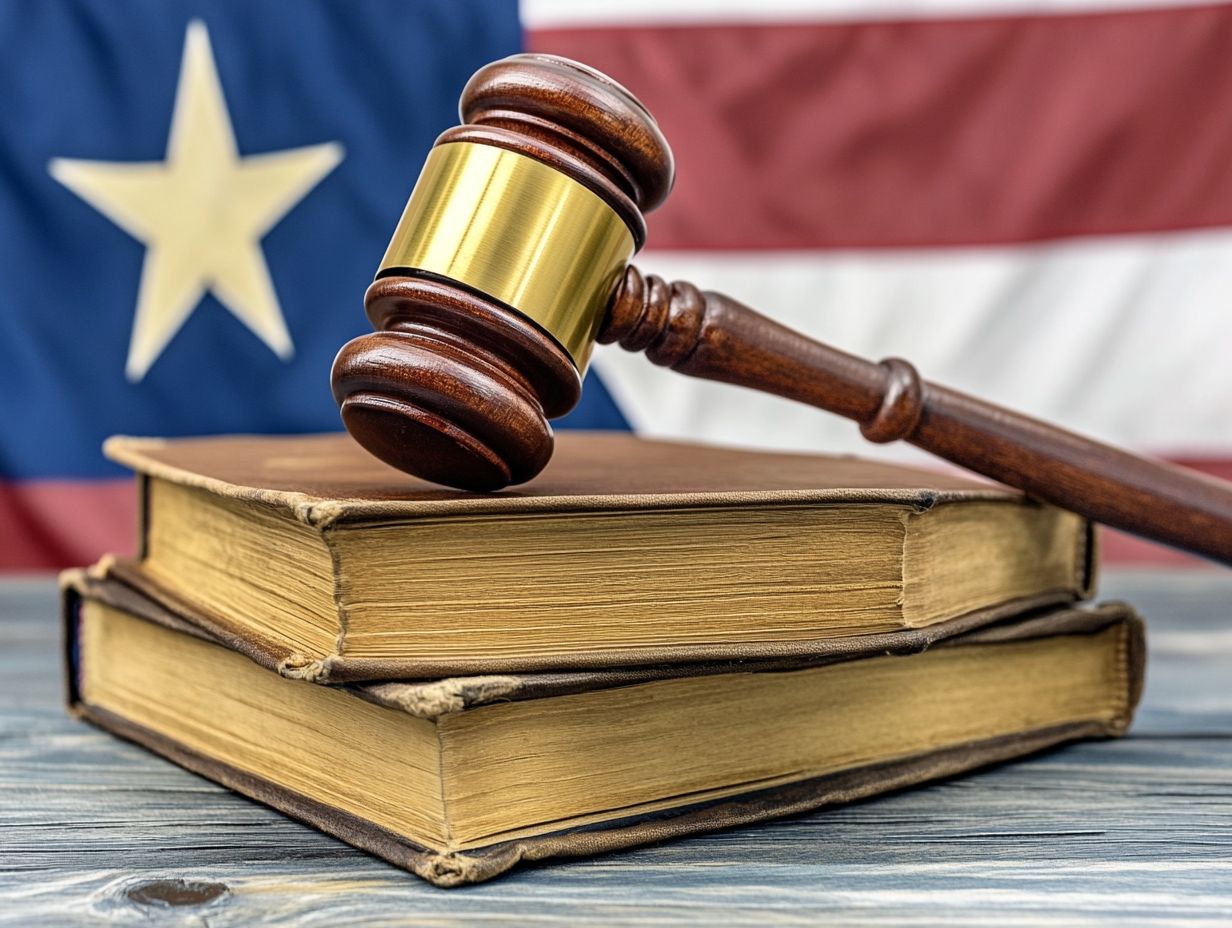The Importance of Understanding South Carolina Laws
Understanding the laws of South Carolina is essential for both residents and newcomers. These regulations shape daily life and influence societal norms. Let’s explore the fascinating history and evolution of South Carolina’s legal system!
This overview delves into significant statutes and landmark court cases. It examines the effects of these laws on individuals and communities, clarifies common legal terminology, and offers resources for those eager to expand their knowledge. Prepare to navigate the intricate legal landscape of the Palmetto State.
Contents
- Key Takeaways:
- Overview of South Carolina Laws
- Key Laws and Regulations
- The Impact of South Carolina Laws
- Understanding Legal Terminology
- Resources for Learning About South Carolina Laws
- Frequently Asked Questions
- What are the main reasons for understanding South Carolina laws?
- Where can I find information about South Carolina laws?
- Why is it important for residents of South Carolina to understand the state’s laws?
- What are the consequences of not understanding South Carolina laws?
- Are South Carolina laws different from other states’ laws?
- How can understanding South Carolina laws benefit my business?
Key Takeaways:

- Understanding South Carolina laws is crucial for navigating the state’s legal system and avoiding potential legal consequences.
- Familiarity with important statutes, court cases, and legal terminology helps individuals make informed decisions and protect their rights.
- Utilizing available resources, such as websites, organizations, and publications, can aid in gaining a deeper understanding of South Carolina laws and their impact on society.
Overview of South Carolina Laws
The legal landscape of South Carolina is shaped by a strong constitutional framework and a comprehensive set of laws enacted by the General Assembly. These laws govern a spectrum of issues, from personal injury claims to child support and custody arrangements.
The South Carolina Constitution and the South Carolina Code outline essential guidelines that directly affect your legal rights and obligations. The state’s unique jurisdiction plays a pivotal role in how various legal questions are addressed, especially in matters of negligence and compensation for damages.
Through its legal system, South Carolina strives to harmonize the interests of public service with the rights of the individual, ensuring a balanced approach to justice and legal clarity.
History and Development of the Legal System
The history and development of the legal system in South Carolina present a dynamic narrative reflecting the state’s unique historical context and the evolution of its Constitution.
From its colonial beginnings, the legal framework has undergone significant transformations, particularly with the establishment of the General Assembly. This body played a crucial role in codifying laws that resonated with the local populace.
Key milestones, such as the adoption of the first state Constitution in 1776, laid the groundwork for subsequent amendments addressing pivotal issues like civil rights and judicial integrity. These amendments articulated citizens’ rights and reformed the courts, making strides toward a more equitable legal environment.
As the years have passed, modern legal reforms continue to shape South Carolina’s laws, reflecting an ongoing commitment to justice and progress that evolves alongside the needs of its citizens.
Key Laws and Regulations
In South Carolina, key laws and regulations establish a framework governing a range of legal matters, including personal injury claims, comparative negligence, and child support. Understanding these laws can be a game-changer for your legal journey. Don’t wait start learning today!
Grasping these laws is essential for navigating the legal landscape with confidence and effectiveness.
For personalized guidance, consider consulting a legal expert.
Important Statutes and Codes

The South Carolina Code includes a range of vital statutes that establish the legal framework for matters such as compensation, liability, and personal injury claims.
One of the most critical among these is the comparative negligence statute, which plays a key role in determining how fault is assessed in accident cases. This statute recognizes shared fault, meaning that if you’re found partially responsible for your injuries, your compensation could be reduced accordingly.
Statutes of limitations are equally important, as they set strict time frames within which you must file your claim after an injury. Understanding these essential provisions guides you in pursuing justice. They also help legal professionals navigate the complexities affecting personal injury cases.
The strategic application of these statutes can have a significant impact on the recovery process for victims like you.
Notable Court Cases and Precedents
Notable court cases in South Carolina have established significant legal precedents that continuously shape how laws regarding negligence and liability are interpreted. These landmark decisions highlight evolving standards of care expected in personal injury cases.
For example, the case of *Doe v. Taylor* laid down essential guidelines concerning the duty of care the responsibility to provide a safe environment that educational institutions owe to their students, which has fundamentally influenced how schools approach safety protocols.
Similarly, *Cannon v. South Carolina* transformed the legal landscape by clarifying the responsibilities of property owners in maintaining safe environments. Such pivotal cases have prompted more stringent public policy measures, fostering heightened awareness and proactive measures among various stakeholders.
The Impact of South Carolina Laws
The influence of South Carolina laws reaches well beyond the confines of the courtroom, significantly shaping societal norms and individual rights. From the legal protections afforded to citizens to the compensation available for personal injury claims, these laws are instrumental in defining the lived experiences of individuals throughout the state.
Effects on Society and Individuals
The effects of South Carolina laws on society and individuals are remarkably significant, especially in areas like personal injury claims and child support obligations. These laws intricately shape your daily life, particularly in influencing family dynamics.
Child support regulations can set financial responsibilities that directly affect the living standards of single parents and their children. Grasping the nuances of compensation laws related to personal injury claims is crucial for you, as they outline the financial recourse available when someone else s negligence causes injury. This not only impacts your life but also the wellbeing of your family and access to necessary medical care.
The interplay between these legal frameworks underscores the importance of being well-informed about your rights and obligations, fostering a society that values justice and responsibility.
Understanding Legal Terminology

Mastering legal terminology is your key to conquering South Carolina laws. This is particularly important when addressing matters like negligence, compensation claims, and your legal rights.
Mastering this language gives you the power to make informed decisions and advocate effectively for yourself in any legal situation.
Don’t hesitate to consult a legal professional or seek additional resources for a better understanding of these vital statutes and codes!
Commonly Used Terms and Definitions
Commonly used legal terms in South Carolina include negligence, compensation, legal responsibility, and legal rights. Each term plays a pivotal role in understanding the legal landscape.
Negligence refers to failing to exercise appropriate care, often resulting in harm or injury. For example, think of a car accident caused by reckless driving.
Compensation is the monetary reward you receive for covering losses and expenses, especially in personal injury cases.
Legal responsibility means being held legally accountable for actions, which can significantly influence insurance claims and settlements.
Legal rights are the protections you have under the law, ensuring fairness and justice. These rights encompass everything from freedom of speech to the right to due process in court. Understanding these terms enhances your ability to navigate the legal system effectively.
Resources for Learning About South Carolina Laws
Accessing resources to learn about South Carolina laws is essential if you’re looking to grasp your legal rights and obligations. Don’t wait! Access these resources now to empower yourself with knowledge about your legal rights.
Whether through official publications, reputable organizations, or legal assistance services, these resources provide clarity and guidance.
Websites, Organizations, and Publications
Numerous websites, organizations, and publications serve as invaluable resources for understanding South Carolina laws. This includes the South Carolina Code and legal aid organizations.
One standout resource is the South Carolina Bar Association, offering a wealth of information. It guides you through legal procedures and connects you with qualified attorneys to assist with your legal needs.
Websites like Legal Aid of South Carolina provide crucial support for individuals facing civil legal issues, ensuring you have access to the necessary resources.
Publications like ‘South Carolina Lawyer’ magazine delve into recent case law and legislative updates, making complex legal information easier to digest. The South Carolina Judicial Department’s website also presents essential court-related resources, including downloadable forms and local court details, enhancing your understanding of the state’s legal framework.
Frequently Asked Questions

What are the main reasons for understanding South Carolina laws?
Understanding South Carolina laws is important for several reasons:
- It helps you follow the law and avoid potential legal consequences.
- It protects your rights and interests in legal matters.
- It enables you to make informed decisions about your personal and professional life.
Where can I find information about South Carolina laws?
You can find information about South Carolina laws by visiting the official website of the South Carolina Legislature. Additionally, consulting a lawyer who specializes in the state’s laws is advisable. Many legal databases and online resources also provide access to state laws and regulations.
Why is it important for residents of South Carolina to understand the state’s laws?
As a resident of South Carolina, understanding the state’s laws is crucial for living lawfully. It ensures you are aware of your rights and responsibilities, helping you avoid legal issues in the future. This knowledge also assists in participating in the state’s political and social processes.
What are the consequences of not understanding South Carolina laws?
Not understanding South Carolina laws can have serious consequences, including:
- Unintentional violations that may lead to fines, penalties, or jail time.
- Vulnerability to unscrupulous individuals or businesses who may exploit your lack of legal knowledge.
Are South Carolina laws different from other states’ laws?
Yes, every state has its own laws and regulations. South Carolina laws are unique and may differ from those in other states.
Understanding these laws is crucial to avoid legal issues. Familiarize yourself with your state s regulations to stay compliant.
How can understanding South Carolina laws benefit my business?
As a business owner, knowing South Carolina laws is vital for your success. It helps you meet legal requirements, such as taxes and permits, and keeps you safe from potential lawsuits.
Staying informed about these laws can give you a competitive edge. Be proactive about changes or updates that might affect your industry!



